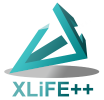Third-party dependencies#
How to install BLAS and LAPACK libraries#
Using UmfPack or Arpack means using BLAS and LAPACK libraries. XLiFE++ offers the ability to choose your BLAS/LAPACK installation:
How to install UmfPack library#
UmfPack is provided by SuiteSparse. When looking how UmfPack is compiled, it seems that it can depend (maybe in the same way as BLAS/LAPACK) on other libraries provided by SuiteSparse.
In the same way, XLiFE++ offers you the ability to choose your UmfPack installation:
An old installation of UmfPack alone (from fortran sources);
-
An installation of UmfPack or SuiteSparse from your favorite package manager;
macOS
On macOS, main package managers are brew and port
Unix/Linux
On Unix/Linux, main package managers are apt-get, yum, rpm, …
-
An installation of SuiteSparse sources by yourself. We highly recommend you to choose the release relying on Cmake to be build.
Windows
On Windows, we recommend you to download binary files on XLiFE++ website to avoid this step.
How to install Arpack library#
Arpack requires BLAS and LAPACK routines. See above.
Hint
XLiFE++ uses the wrapper Arpack++. Because of its deprecation, a patch at http://reuter.mit.edu/index.php/software/arpackpatch/ needs to be applied to ensure a correct compilation. With the evolution of compilers, this patch is often not enough now. This is the reason why XLiFE++ contains its own patched release of Arpack++, used by default.
macOS
On macOS, you may rely on the distribution provided by your favorite package manager (brew, port, …)
Warning
If you use brew, and depending either on your OS or on the version of your compiler (g++ or clang++), installing Arpack requires to use it with BLAS and LAPACK libraries also provided by brew (OpenBLAS distribution), as default BLAS and LAPACK libraries found by Cmake are the one provided by macOS. The same problem may occur if you use the Arpack library provided by XLiFE++
Unix/Linux
On Unix/Linux, you may rely on the distribution provided by your favorite package manager (apt-get, yum, rpm, …)
Windows
On Windows, we recommend you to download binary files on the XLiFE++ website to avoid this step.
How to install MinGW 64 bits on Windows#
When you download CodeBlocks, the default compiler is MinGW 32bits. To use the full capabilities of XLiFE++, you may want to use a 64 bits compiler.
The easiest and safest way to install MinGW-W64 is to avoid the use of an installer and to download the binaries directly from the url from the https://sourceforge.net/projects/mingw-w64/files/Toolchains%20targetting%20Win64/Personal%20Builds/mingw-builds/. You select the version you need, for instance 7.3.0. You click on “threads-posix” directory, on one of the directories (sjlj, seh, …). Personally, I would choose the directory having the best download rate per week. Finally, you click on the archive to download it.
